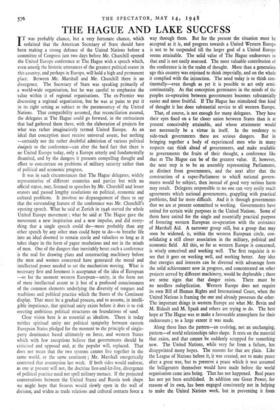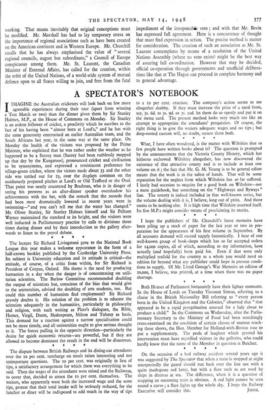THE HAGUE AND LAKE SUCCESS
IT was probably chance, but a very fortunate chance, which ordained that the American Secretary of State should have been making a strong defence of the United Nations before a committee of Congress just two days before Mr. Churchill opened the United Europe conference at The Hague with a speech which, even among the historic utterances of the greatest political orator in this country, and perhaps in Europe, will hold a high and permanent place. Between Mr. Marshall and Mr. Churchill there is no divergence. The Secretary of State was speaking primarily of a world-wide organisation, but he was careful to emphasise the value within it of regional organisations. The ex-Premier was discussing a regional organisation, but he was at pains to put it in its right setting as subject to the paramountcy of the United Nations. That compatibility assumed, that reconciliation assured, the delegates at The Hague could go forward, in the enthusiasm that had gathered them there, with the elaboration of projects for what was rather imaginatively termed United Europe. As an ideal that conception must receive universal assent, but nothing —certainly not the rather doubtful admission of various political émigrés to the conference—can alter the hard fact that there is no United Europe today, only a Europe utterly and fundamentally disunited, and by the dangers it presents compelling thought and effort to concentrate on problems of military security rather than of political and economic progress.
It was in such circumstances that The Hague delegates, widely representative of different countries and parties but with no official status, met, listened to speeches by Mr. Churchill and lesser orators and passed lengthy resolutions on political, economic and cultural problems. It involves no disparagement of these to say that the outstanding feature of the conference was Mr. Churchill's opening speech. What he said at Zurich in 1946 started the whole United Europe movement ; what he said at The Hague gave the movement a new inspiration and a new impulse, and did every- thing that a single speech could do—more probably than any other speech by any other man could hope to do—to breathe life into an ideal doomed to remain sterile and valueless so long as it takes shape in the form of paper resolutions and not in the minds of men. One of the dangers that inevitably beset such a conference is the zeal for drawing plans and constructing machinery before the men and women concerned have generated the moral and intellectual power needed to set the mechanism moving. What is necessary first and foremost is acceptance of the idea of European —or for the moment western European—unity, in the form not of mere intellectual assent to it but of a profound consciousness of the common elements underlying the diversity of tongues and traditions and political practice which the • States of the Continent display. That must be a gradual process, and to assume, in intelli- gible impatience, that spiritual unity exists before it does is to risk erecting ambitious political structures on foundations of sand.
Clear vision here is as essential as idealism. There is today neither spiritual unity nor political sympathy between eastern European States pledged for the moment to the principle of single- party dominance based ultimately on force, and western States which with few exceptions believe that governments should be criticised and opposed and, at the popular will, replaced. That does not mean that the two systems cannot live together in the same world, or the same continent ; Mr. Marshall energetically contested that assumption last week. If both sides would endorse, as one at present will not, the doctrine live-and-let-live, divergence of political practice need not spell military menace. If the projected conversations between the United States and Russia took shape we might hope that fissures would slowly open in the wall of division, and widen as trade relations and cultural contacts force a way through them. But for the present the situation must be accepted as it is, and progress towards a United Western Europe is not to be suspended till the larger goal of a United Europe seems attainable. The solid value of The Hague endeavours to that end is not easily assessed. The most valuable contribution of the conference is in the realm of thought. More than a generation ago this country was enjoined to think imperially, and on the whole it complied with the injunction. The need today is to think con- tinentally—even though as yet it is possible to act only semi- continentally. As that conception germinates in the_minds of the peoples co-operation between governments becomes substantially easier and more fruitful If The Hague has stimulated that kind of thought it has done substantial service to all Western Europe.
That, of course, is not enough for many delegates. They have their eyes fixed on a far closer union between States than is at present conceivably attainable, and whose attainment would not necessarily be a virtue in itself. In the tendency to side-track governments there are serious dangers. But in bringing together a body of experienced men who in many respects can think ahead of governments, and make available to governments the fruits of their thought, a conference like that at The Hague can be of the greatest value. If, however, the next step is to be an assembly representing Parliaments, as distinct from governments, and the next after that the construction of a super-Parliament to which national govern- ments would be subject, then instead of good very serious harm may result. Delegates responsible to no one can very easily reach agreements which national governments, grappling with practical problems, find far more difficult. And it is through governments that we are at present committed to working. Governments have united for certain wide purposes in the United Nations. Some of them have united for the single and essentially practical purpose of fostering western European co-operation with the assistance of Marshall Aid. A narrower group still, but a group that may soon be widened, is, within the western European circle, con- solidating a still closer association in the military, political and economic field. All this, so far as western Europe is concerned, is wisely conceived and working well. The first requisite is to see that it goes on working well, and working better. Any idea that energies and interests can be diverted with advantage from the solid achievement now in progress, and concentrated on other projects served by different machinery, would be deplorable ; there are some signs that that danger exists. There must be no needless reduplication. Western Europe does not require its own Bill of Human Rights and International Court, when the United Nations is framing the one and already possesses the other. The important things in western Europe are what Mr. Bevin and M. Bidault and M. Spaak and others are trying to do. The best hope at The Hague was to make a favourable atmosphere for their endeavours ; to a large extent it was made.
Along those lines the pattern—an evolving, not an unchanging, pattern—of world relationships takes shape. It rests on the material that exists, and that cannot be suddenly scrapped for something new. The United Nations, while very far from a failure, has disappointed many hopes. The reasons for that are plain. Like the League of Nations before it, it was created, not to make peace after a great war, but to preserve a peace which it was assumed the belligerents themselves would have made before the world organisation came into being. That has not happened. Real peace has not yet been established. In addition one Great Power, for reasons of its own, has been engaged consistently not in helping to make the United Nations work, but in preventing it from working. That means inevitably that original conceptions must be modified. Mr. Marshall has had to lay temporary stress on the importance of regional associations such as have been created on the American continent and in Western Europe. Mr. Churchill recalls that he has always emphasised the value of " several regional councils, august but subordinate," a Council of Europe conspicuous among them. Mr. St. Laurent, the Canadian Minister of External Affairs, has called for the creation, within the orbit of the United Nations, of a world-wide system of mutual defence open to all States willing to join, and free from the fatal impediment of the irresponsible veto ; and with that Mr. Bevin has expressed full agreement. Here is a concurrence of thought that must find expression in action. The precise method is matter for consideration. The creation of such an association as Mr. St. Laurent contemplates by means of a resolution of the United Nations Assembly (where no veto exists) might be the best way of assuring full co-ordination. However that may be decided, official co-operation through governments and unofficial delibera- tions like that at The Hague can proceed in complete harmony and to general advantage.































 Previous page
Previous page